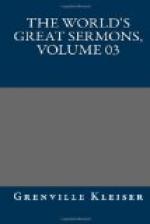EDWARDS
1703-1758
SPIRITUAL LIGHT
And Jesus answered and said unto him, Blessed art thou, Simon Barjona: for flesh and blood hath not revealed it unto thee, but my Father which is in heaven.—Matthew xvi., 17.
Christ says these words to Peter upon occasion of his professing his faith in Him as the Son of God. Our Lord was inquiring of His disciples, who men said He was; not that He needed to be informed, but only to introduce and give occasion to what follows. They answer, that some said He was John the Baptist, and some Elias, and others Jeremias, or one of the prophets. When they had thus given an account of who others said He was, Christ asks them, who they said He was? Simon Peter, whom we find always zealous and forward, was the first to answer: he readily replied to the question, Thou art Christ, the Son of the living God.
Upon this occasion Christ says as He does to him, and of him in the text: in which we may observe,
1. That Peter is pronounced blest on this account. “Blessed art Thou.”—“Thou art a happy man, that thou art not ignorant of this, that I am Christ, the Son of the living God. Thou art distinguishingly happy. Others are blinded, and have dark and deluded apprehensions, as you have now given an account, some thinking that I am Elias, and some that I am Jeremias, and some one thing and some another; but none of them thinking right, all of them misled. Happy art thou, that art so distinguished as to know the truth in this matter.”
2. The evidence of this his happiness declared; viz., that God, and He only, had revealed it to him. This is an evidence of his being blest.
First. As it shows how peculiarly favored he was of God above others: “How highly favored art thou, that others that are wise and great men, the scribes, Pharisees, and rulers, and the nation in general, are left in darkness, to follow their own misguided apprehensions; and that thou shouldst be singled out, as it were, by name, that my heavenly Father should thus set His love on thee, Simon Barjona. This argues thee blest, that thou shouldst thus be the object of God’s distinguishing love.”
Secondly. It evidences his blessedness also, as it intimates that this knowledge is above any that flesh and blood can reveal. “This is such knowledge as my Father which is in heaven only can give: it is too high and excellent to be communicated by such means as other knowledge is. Thou art blest, that thou knowest that which God alone can teach thee.”




